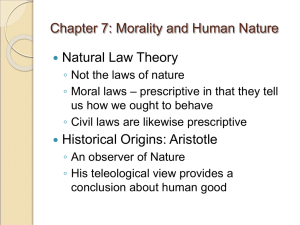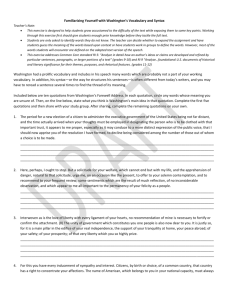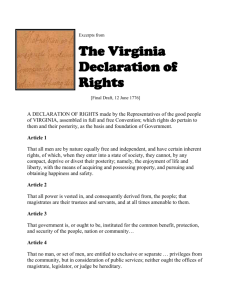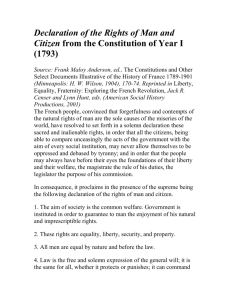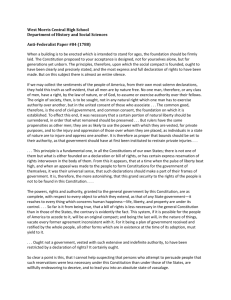Readings Package – Enlightened Despotism
advertisement
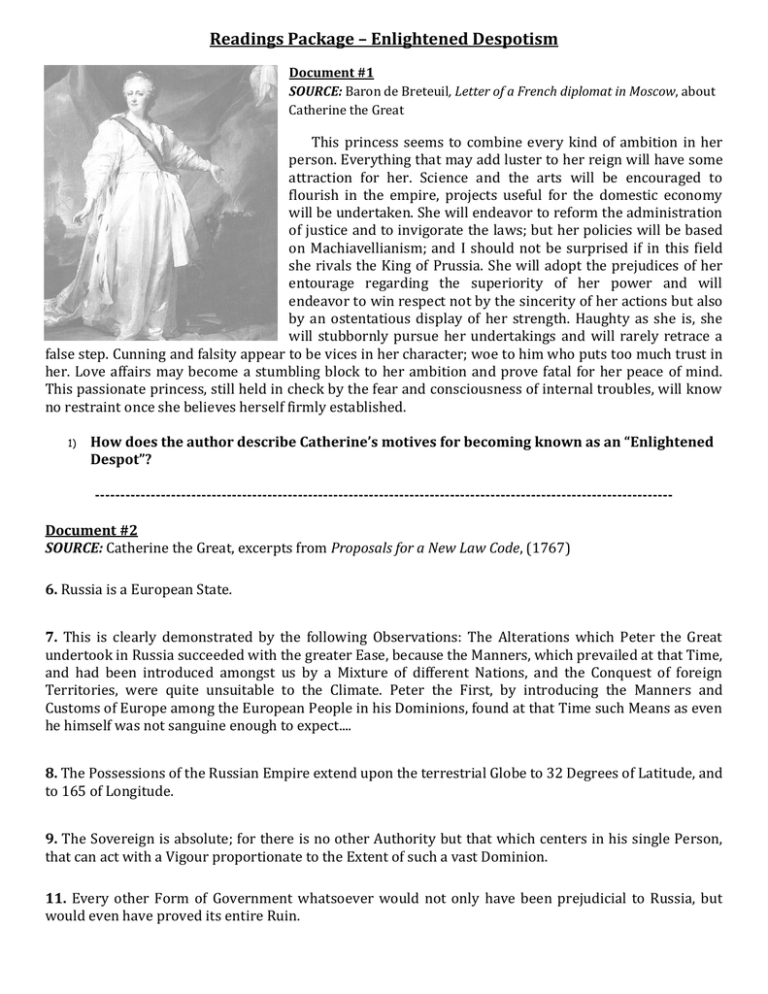
Readings Package – Enlightened Despotism Document #1 SOURCE: Baron de Breteuil, Letter of a French diplomat in Moscow, about Catherine the Great This princess seems to combine every kind of ambition in her person. Everything that may add luster to her reign will have some attraction for her. Science and the arts will be encouraged to flourish in the empire, projects useful for the domestic economy will be undertaken. She will endeavor to reform the administration of justice and to invigorate the laws; but her policies will be based on Machiavellianism; and I should not be surprised if in this field she rivals the King of Prussia. She will adopt the prejudices of her entourage regarding the superiority of her power and will endeavor to win respect not by the sincerity of her actions but also by an ostentatious display of her strength. Haughty as she is, she will stubbornly pursue her undertakings and will rarely retrace a false step. Cunning and falsity appear to be vices in her character; woe to him who puts too much trust in her. Love affairs may become a stumbling block to her ambition and prove fatal for her peace of mind. This passionate princess, still held in check by the fear and consciousness of internal troubles, will know no restraint once she believes herself firmly established. 1) How does the author describe Catherine’s motives for becoming known as an “Enlightened Despot”? ------------------------------------------------------------------------------------------------------------------ Document #2 SOURCE: Catherine the Great, excerpts from Proposals for a New Law Code, (1767) 6. Russia is a European State. 7. This is clearly demonstrated by the following Observations: The Alterations which Peter the Great undertook in Russia succeeded with the greater Ease, because the Manners, which prevailed at that Time, and had been introduced amongst us by a Mixture of different Nations, and the Conquest of foreign Territories, were quite unsuitable to the Climate. Peter the First, by introducing the Manners and Customs of Europe among the European People in his Dominions, found at that Time such Means as even he himself was not sanguine enough to expect.... 8. The Possessions of the Russian Empire extend upon the terrestrial Globe to 32 Degrees of Latitude, and to 165 of Longitude. 9. The Sovereign is absolute; for there is no other Authority but that which centers in his single Person, that can act with a Vigour proportionate to the Extent of such a vast Dominion. 11. Every other Form of Government whatsoever would not only have been prejudicial to Russia, but would even have proved its entire Ruin. 12. Another Reason is: That it is better to be subject to the Laws under one Master, than to be subservient to many. 13. What is the true End1 of Monarchy? Not to deprive People of their natural Liberty; but to correct their Actions, in order to attain the supreme Good. 14. The Form of Government, therefore, which best attains this End, and at the same Time sets less Bounds than others to natural Liberty, is that which coincides with the Views and Purposes of rational Creatures, and answers the End… 15. The Intention and the End of Monarchy, is the Glory of the Citizens, of the State, and of the Sovereign. 16. But, from this Glory, a Sense of Liberty arises in a People governed by a Monarch; which may produce in these States as much Energy in transacting the most important Affairs, and may contribute as much to the Happiness of the Subjects, as even Liberty itself.... 33. The Laws ought to be so framed, as to secure the Safety of every Citizen as much as possible. 34. The Equality of the Citizens consists in this; that they should all be subject to the same Laws. 35. This Equality requires Institutions so well adapted, as to prevent the Rich from oppressing those who are not so wealthy as themselves, and converting all the Charges and Employments entrusted to them as Magistrates only, to their own private Emolument.... 37. In a State or Assemblage of People that live together in a Community, where there are Laws, Liberty can only consist in doing that which every One ought to do, and not to be constrained to do that which One ought not to do. 38. A Man ought to form in his own Mind an exact and clear Idea of what Liberty is. Liberty is the Right of doing whatsoever the Laws allow: And if any one Citizen could do what the Laws forbid, there would be no more Liberty; because others would have an equal Power of doing the same. 39. The political Liberty of a Citizen is the Peace of Mind arising from the Consciousness, that every Individual enjoys his peculiar Safety; and in order that the People might attain this Liberty, the Laws ought to be so framed, that no one Citizen should stand in Fear of another; but that all of them should stand in Fear of the same Laws.... 123. The Usage of Torture is contrary to all the Dictates of Nature and Reason; even Mankind itself cries out against it, and demands loudly the total Abolition of it. 180. That Law, therefore, is highly beneficial to the Community where it is established, which ordains that every Man shall be judged by his Peers and Equals. For when the Fate of a Citizen is in Question, all Prejudices arising from the Difference of Rank or Fortune should be stifled; because they ought to have no Influence between the Judges and the Parties accused. 1 By end, she means purpose or goal. Like, “the end justifies the means.” 194. (1.) No Man ought to be looked upon as guilty, before he has received his judicial Sentence; nor can the Laws deprive him of their Protection, before it is proved that he has forfeited all Right to it. What Right therefore can Power give to any to inflict Punishment upon a Citizen at a Time, when it is yet dubious, whether he is Innocent or guilty? 250. A Society of Citizens, as well as every Thing else, requires a certain fixed Order: There ought to be some to govern, and others to obey. 251. And this is the Origin of every Kind of Subjection; which feels itself more or less alleviated, in Proportion to the Situation of the Subjects. 252. And, consequently, as the Law of Nature commands Us to take as much Care, as lies in Our Power, of the Prosperity of all the People; we are obliged to alleviate the Situation of the Subjects, as much as sound Reason will permit. 253. And therefore, to shun all Occasions of reducing People to a State of Slavery, except the utmost Necessity should inevitably oblige us to do it; in that Case, it ought not to be done for our own Benefit; but for the Interest of the State: Yet even that Case is extremely uncommon. 1) 2) 3) How do the legal ideas that Catherine proposes reflect the ideas of the Enlightenment? Translate proposal 37 into plain English. Are Catherine’s proposals more inspired by Hobbes or Locke? Select two of Catherine’s proposals and identify an idea expressed by either man that may have inspired each proposal. ------------------------------------------------------------------------------------------------------------------ Document #3 SOURCE: Catherine the Great, excerpts from A Decree on Serfs, (1767) The Governing Senate. . . has deemed it necessary to make known that the landlords' serfs and peasants . . . owe their landlords proper submission and absolute obedience in all matters, according to the laws that have been enacted from time immemorial by the autocratic forefathers of Her Imperial Majesty and which have not been repealed, and which provide that all persons who dare to incite serfs and peasants to disobey their landlords shall be arrested and taken to the nearest government office, there to be punished forthwith as disturbers of the public tranquility, according to the laws and without leniency. And should it so happen that even after the publication of the present decree of Her Imperial Majesty any serfs and peasants should cease to give the proper obedience to their landlords . . . and should make bold to submit unlawful petitions complaining of their landlords, and especially to petition Her Imperial Majesty personally, then both those who make the complaints and those who write up the petitions shall be punished by the knout and forthwith deported to Nerchinsk to penal servitude for life and shall be counted as part of the quota of recruits which their landlords must furnish to the army. And in order that people everywhere may know of the present decree, it shall be read in all the churches on Sundays and holy days for one month after it is received and thereafter once every year during the great church festivals, lest anyone pretend ignorance. 1) Does this document reflect Enlightenment ideals? Explain your answer. Document #4 SOURCE: Letter of Emperor Joseph II of Austria Mr. Vice-Chancellor—The present system of taxation in my dominions, and the inequality of the taxes which are imposed on the nation, form a subject too important to escape my attention. I have discovered that the principles on which it is founded are unsound, and have become injurious to the industry of the peasant; that there is neither equality, nor equity, between the hereditary provinces with each other, nor between individual proprietors, and therefore it can no longer continue. With this view I give you the necessary orders to introduce a new system of taxation, by which the contribution, requisite for the wants of the state, may be effected without augmenting the present taxes, and the industry of the peasant, at the same time, be freed from all impediments. Since my accession to the throne, I have ever been anxious to conquer the prejudices against my station, and have taken pains to gain the confidence of my people; I have several times since given proof, that the welfare of my subjects is my passion; that to satisfy it, I shun neither labor, nor trouble, nor even vexations, and reflect well on the means which are likely to promote my views; and yet in my reforms, I everywhere find opposition from people, of whom I least expect it. Sir,—Till now the Protestant religion has been opposed in my states; its adherents have been treated like foreigners; civil rights, possession of estates, titles, and appointments, all were refused them. I determined from the very commencement of my reign to adorn my diadem with the love of my people, to act in the administration of affairs according to just, impartial, and liberal principles; consequently, I granted toleration, and removed the yoke which had oppressed the protestants for centuries. Fanaticism shall in future be known in my states only by the contempt I have for it; nobody shall any longer be exposed to hardships on account of his creed; no man shall be compelled in future to profess the; religion of the state, if it be contrary to his persuasion, and if he have other ideas of the right way of insuring blessedness. In future my Empire shall not be the scene of abominable intolerance. Fortunately no sacrifices like those of Galas and Sirven have ever disgraced any reign in this country. If, in former times, the will of the monarch furnished opportunities for injustice, if the limits of executive power were exceeded and private hatred acted her part, I can only pity those monarchs who were nothing but kings. Tolerance is an effect of that beneficent increase of knowledge which now enlightens Europe, and which is owing to philosophy and the efforts of great men; it is a convincing proof of the improvement of the human mind, which has boldly reopened a road through the dominions of superstition, which was trodden centuries ago by Zoroaster and Confucius, and which, fortunately for mankind, has now become the highway of monarchs. Adieu! 1. How do the policies of Joseph on religion reflect the ideas of Voltaire?
